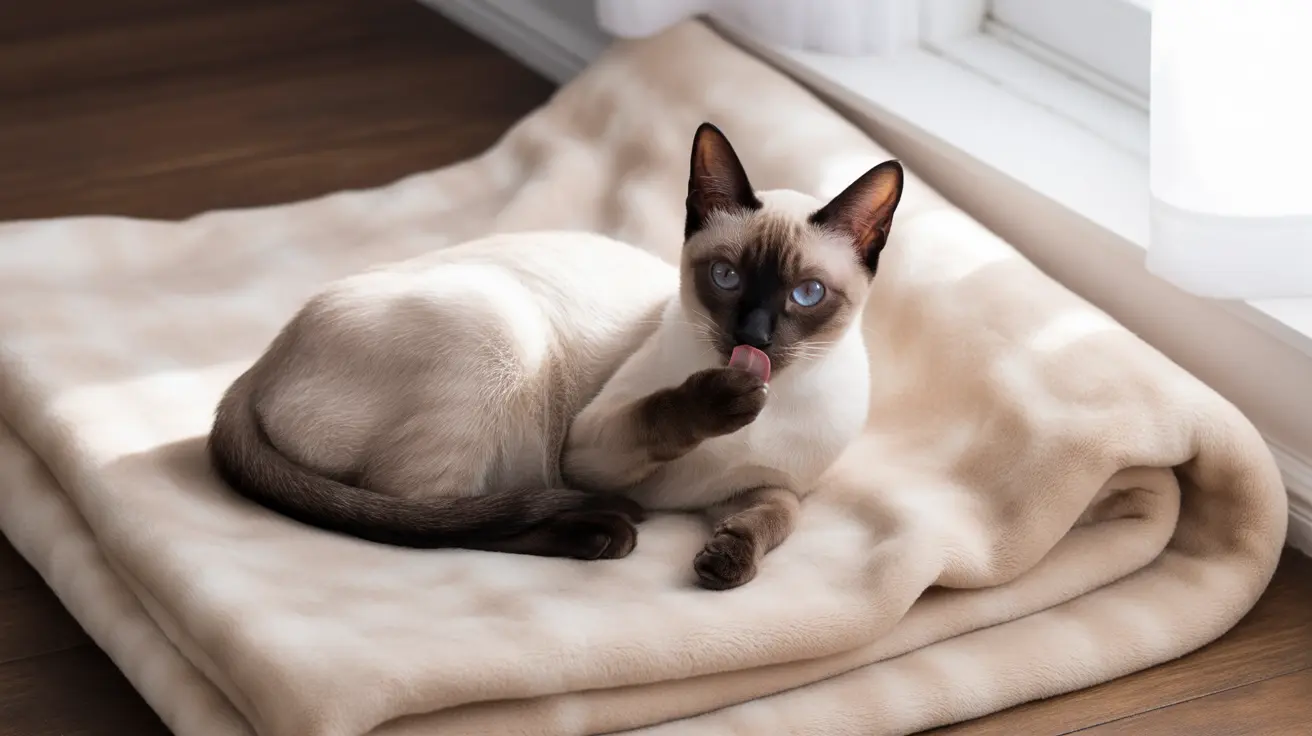If you've ever caught your cat intensely licking or sucking on your favorite blanket, you're not alone. This curious behavior, while sometimes concerning to pet owners, is actually quite common among domestic cats. Understanding why cats engage in blanket licking can help you determine whether it's a normal behavior or a sign that requires attention.
In this comprehensive guide, we'll explore the various reasons behind this fascinating feline habit, when you should be concerned, and how to address excessive blanket licking if needed.
Common Reasons for Blanket Licking Behavior
Early Weaning and Comfort Seeking
One of the most common reasons cats lick blankets is linked to their early life experiences. Cats who were separated from their mothers before 8 weeks of age often develop this behavior as a way to self-soothe. The act of licking and sucking on soft materials mimics the comfort they felt while nursing.
Stress and Anxiety Relief
Just as humans might have comfort behaviors when stressed, cats may turn to blanket licking as a coping mechanism. Environmental changes, new pets, or disruptions to their routine can trigger this behavior as a way to self-soothe and reduce anxiety.
Medical Considerations and Pica
Sometimes, blanket licking can indicate underlying health issues. Pica, a condition where cats compulsively eat non-food items, may manifest as excessive blanket licking or chewing. This condition can be dangerous if cats actually ingest fabric pieces.
Nutritional Deficiencies
In some cases, cats may lick blankets due to nutritional deficiencies in their diet. This behavior might be their way of seeking out missing nutrients, though it's important to have a veterinarian confirm any suspected dietary issues.
Behavioral and Environmental Factors
Scent Marking and Territory
Cats have scent glands in their tongues, and blanket licking might be their way of marking territory or mixing their scent with yours. This is especially common with blankets that carry their owner's scent.
Boredom and Lack of Stimulation
Some cats turn to blanket licking simply because they're understimulated. Without enough environmental enrichment or playtime, cats may develop this behavior as a way to keep themselves occupied.
How to Address Excessive Blanket Licking
If your cat's blanket licking becomes concerning, consider these steps:
- Provide alternative comfort items like cat-specific blankets or toys
- Ensure regular playtime and environmental enrichment
- Maintain consistent daily routines
- Consider using anxiety-reducing products if stress is the cause
- Consult with your veterinarian to rule out medical issues
Frequently Asked Questions
Why is my cat licking or suckling on my blanket so often?
Cats often lick blankets as a self-soothing behavior, particularly if they were weaned too early. This behavior can also be triggered by stress, anxiety, or the comfort of familiar scents. In most cases, occasional blanket licking is normal and harmless.
Can blanket licking in cats be a sign of stress or anxiety?
Yes, blanket licking can indicate stress or anxiety in cats. Environmental changes, new pets, or disruptions to their routine may cause them to seek comfort through this behavior. If the licking seems excessive, consider consulting with your veterinarian about potential anxiety triggers.
Is it normal for adult cats to lick or suck on blankets, and what causes this behavior?
While more common in kittens and young cats, adult cats may also lick blankets. This behavior often stems from early weaning, comfort-seeking, or stress relief. Some breeds, particularly Siamese cats, are more prone to this behavior.
Could my cat licking blankets indicate an underlying health issue like pica or dental problems?
Yes, excessive blanket licking could signal health issues like pica (compulsive eating of non-food items) or dental problems. If your cat's licking behavior suddenly increases or is accompanied by other symptoms, consult your veterinarian.
How can I safely discourage my cat from licking or chewing on blankets without causing stress?
To discourage excessive blanket licking, provide alternative comfort items, increase playtime and environmental enrichment, and maintain consistent routines. Never punish your cat for this behavior, as it may increase anxiety. Instead, gently redirect their attention to appropriate toys or activities.
Conclusion
While blanket licking is usually harmless, understanding its underlying causes helps ensure your cat's well-being. Monitor the behavior's frequency and intensity, and consult with your veterinarian if you notice concerning changes or if the behavior becomes compulsive.






